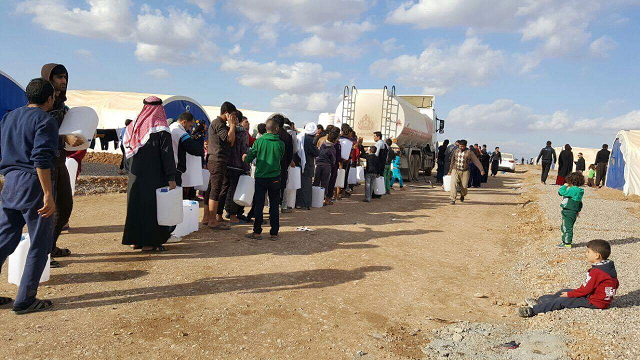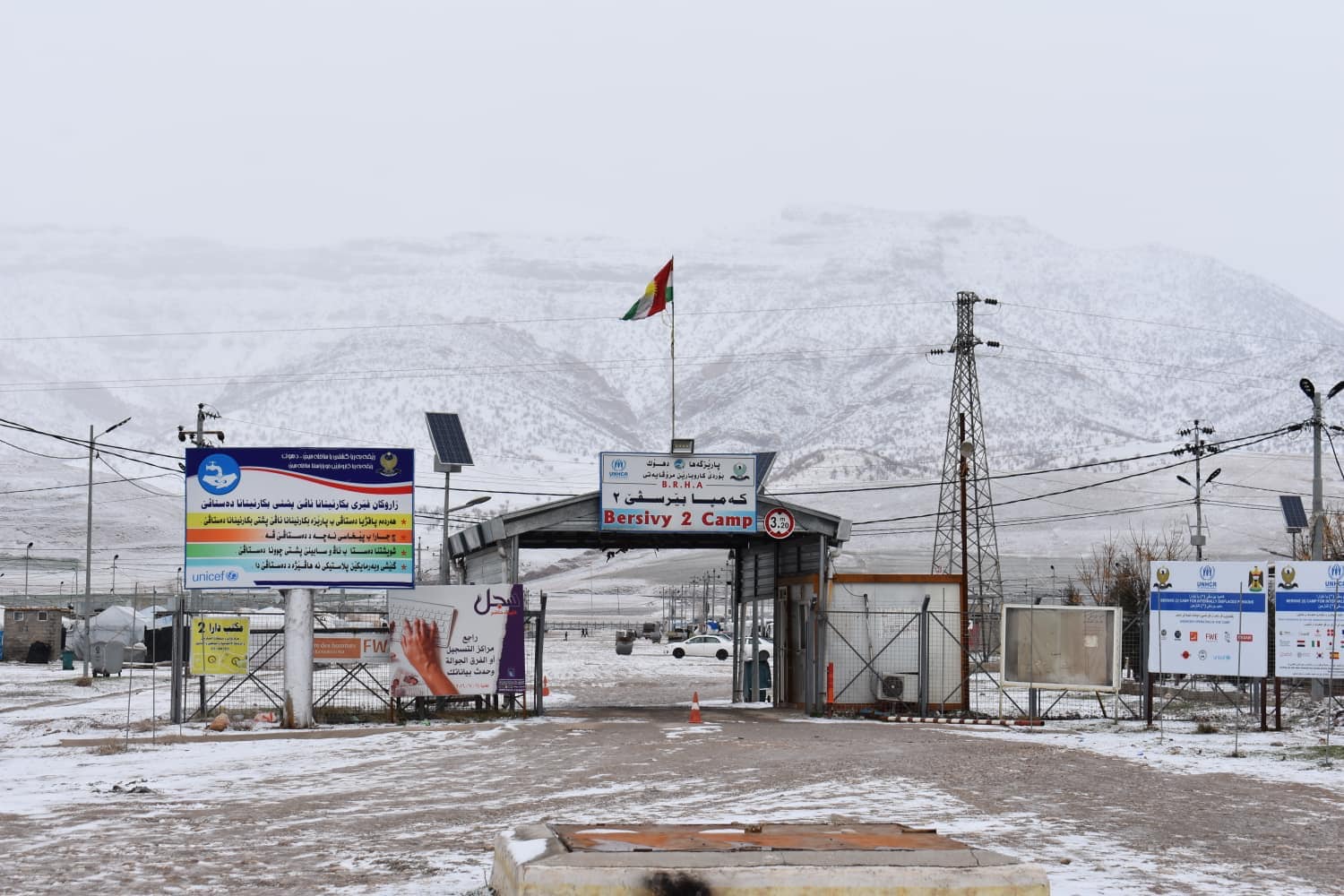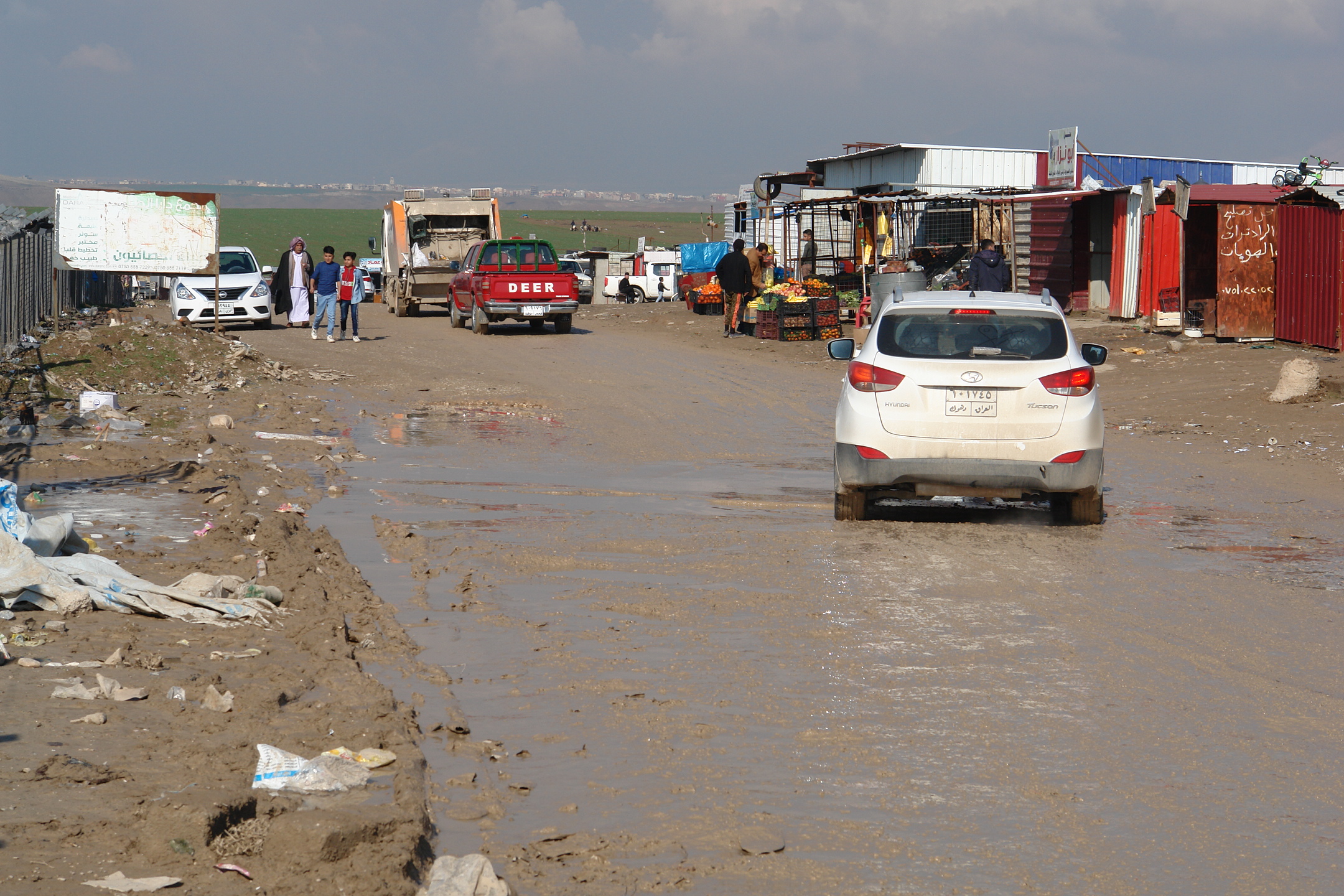There is no big difference between the temperature inside and outside Samira's tent as the cold weather easily sneaks into the tent, and she cannot turn on the kerosene heater most of the time, but has to keep her children warm with extra clothes and blankets.
In the harsh winter , Samira switches on the popular kerosene heater for only two hours during daytime because she has not received her share of subsidized Kerosine for heating and cannot afford to buy it from the market.
Samira Badal, 37, has eight children, the youngest child is only four-months-old, and fears they will fall sick due to the cold weather from November up to March.
“We only bought 40 liters a week ago and we hope it will last us as long as we can. We should only light the heater during very cold and rainy days,” said the anxious and powerless mother.
Samira’s family resides in Kabartw camp for the Internally Displaced People IDPs in Dohuk Northern Province where the temperature ranges from 7 to 12 Celsius degrees and drops up to zero during rainfall and snow in neighboring mountainous areas.
Samira and her children have been living in that camp for seven years, after she was displaced from the village of Tal Al-Qasab in Shingal (Sinjar) district, home to the war-ravaged Ezidi (Yazidi) community following the attacks of the Islamic State in Iraq and the Levant ISIL.
Since the start of the cold and rainy season, the IDPs in Dohuk have not received their annual shares of kerosene neither from the Iraqi government nor from the Kurdistan Regional Government KRG in order to use it for heating in cold weather as state power supply sharply drops downs due to high consumption.
“They delay distributing oil from one week to the next, we are tired of promises and we suffer from difficult and bitter living conditions,” Samira told Kirkuk Now. “We need at least two barrels of oil in the winter, but they only distributed one barrel to us last year, we had to buy more by ourselves."
The price of a barrel of kerosene in the market ranges between 150,000 (USD100) to 180,000 Iraqi Dinars IQD.
This amount is too much for Samira’s family. Her husband sells boiled beans while she is a housewife. “We don’t know whether to spend the small amount that my husband earns in order to provide for the family’s daily needs or to buy kerosene, and there is no one to lend us some money to buy it,” Samira bitterly said.

Erbil- The Iraqi Ministry of Migration and Displacement distributes Kerosene to the IDPs. Media department of the Ministry
In the first phase, each displaced family receives 40 liters of kerosine distributed by the Iraqi Ministry of Migration and the Displaced. In the second phase, each family gets another 100 liters. In the third phase, each family receives an additional 60 liters, but the distribution process is late and very slow this year.
The cost of 100 liters of kerosene distributed by the government is 16,000 IQD.
I don't know how to protect my children from the cold. Most of the time, they sit covered with blankets
Zaidan Khalaf, a resident of the Siba Sheikh Khidr complex in Shingal, has been residing in Bajid Kendala camp in Zakho district of Dohuk province, for several years.
"Last year, we received 100 liters and I bought another barrel (220 liters) of kerosene to use throughout the winter, but we did not receive anything this year. The weather is cold and we cannot stay in this way."
Khalaf says that the tent does not heat up as it should, even if we light heaters in it. Therefore, two barrels of oil are not enough for most families throughout the winter. The suffering of the displaced is not only in the winter, and their conditions in the summer are not better than they are now due to the outage of electricity supply for hours.
The temperatures in the areas where the vast majority of the displaced live, especially in Dohuk and other areas of the Kurdistan Region, are lower compared to the other governorates of Iraq which requires more kerosene in winter.
Iskandar Muhammad Amin, director of the Iraqi Department of Migration and Displacement in Dohuk, said "No displaced family in Dohuk has received their share of kerosene, and the reason is due to the Ministry of Migration and Displacement and the Ministry of Oil, which say that there are accounts and procedures between them that needs to be settled before distributing oil to the displaced.”
Amin explained that the Ministry of Migration buys kerosene from the Ministry of Oil annually and distributes it to the displaced for a subsidized amount.
“But what is the fault of the displaced to wait to receive their share of oil during this winter?” exclaimed the official at the Immigration Department.
There are more than 664,000 IDPS in Kurdistan Region of iraq, most of them live in Dohuk, mainly in 16 IDP camps, shows the figures by the KRG.

Dohuk, 2019- The entrance to Bersiv camp in Zakho district. Exclusively for KirkukNow
Pir Alo Kachal, director of Khanki camp for IDPs, said the camp residents ask him daily when kerosene distribution will be launched, without having an answer for any of them because no date is fixed.
"Some displaced families do not have the ability to buy 5 liters of Kerosene, so they have to heat themselves with blankets or using electric heaters, despite the lack of electricity."
Kachal says the displaced received some kerosene last year, about 100 liters, but they did not receive the other 100 liters in the second phase. He pointed out that some organizations used to provide the displaced with kerosene forheating but that has also stopped now.
A large part of the displaced are reluctant to return to their areas of origin due to the deteriorating security conditions, the lack of services and the destruction of their homes.
The director of the Department of Migration and Displacement in Dohuk said, "The distribution of kerosene for this year is two months late. The share of the second phase of last year is still in the fuel depots, but its distribution depends on the ministry's decision, and we have made preparations for that, but the date and mechanism of the distribution process for this year is not yet clear.”





